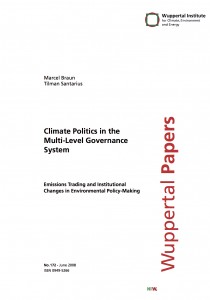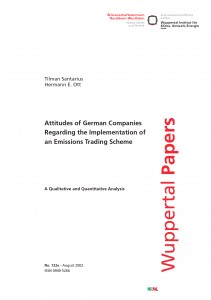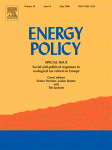Emissions Trading and Institutional Changes in Environmental Policy-Making
 If there was a Guinness Book of Records for environmental policy, the instrument of emissions trading would certainly take a whole chapter. In less than ten years, this complex climate policy instrument has been implemented at various political levels. How did international emissions trading under the Kyoto Protocol come into being? What factors contributed to the rapid introduction of the EU Emissions Trading Scheme? Has the introduction of emissions trading brought about a transfer of power, i.e sovereignty, from national to supranational levels? Theoretically underpinned by multi-level governance theory, Tilman Santarius and Marcel Braun address these and other questions by reconstructing the invention of emissions trading in great detail in the paper “Climate Policy in the Multi-Level Governance System“.
If there was a Guinness Book of Records for environmental policy, the instrument of emissions trading would certainly take a whole chapter. In less than ten years, this complex climate policy instrument has been implemented at various political levels. How did international emissions trading under the Kyoto Protocol come into being? What factors contributed to the rapid introduction of the EU Emissions Trading Scheme? Has the introduction of emissions trading brought about a transfer of power, i.e sovereignty, from national to supranational levels? Theoretically underpinned by multi-level governance theory, Tilman Santarius and Marcel Braun address these and other questions by reconstructing the invention of emissions trading in great detail in the paper “Climate Policy in the Multi-Level Governance System“.
Developments in International and European Climate Policy in 2003
 Looking back on the international climate policy in 2003, two issues dominated the picture: one is the rather unpleasant uncertainty about the implementation of the Kyoto Protocol and the diplomatic tug of war with Russia, set by the signing of the contract in force at last. Second, the extremely positive introduction of an emissions trading scheme in the European Union. With the introduction of this world’s most progressive climate change policy, the EU could in turn bring new vitality to the international negotiations. See here a pdf of the analysis by Hermann Ott and Tilman Santarius, which has been published in the Yearbook of International Environmental Law.
Looking back on the international climate policy in 2003, two issues dominated the picture: one is the rather unpleasant uncertainty about the implementation of the Kyoto Protocol and the diplomatic tug of war with Russia, set by the signing of the contract in force at last. Second, the extremely positive introduction of an emissions trading scheme in the European Union. With the introduction of this world’s most progressive climate change policy, the EU could in turn bring new vitality to the international negotiations. See here a pdf of the analysis by Hermann Ott and Tilman Santarius, which has been published in the Yearbook of International Environmental Law.
Attitudes of German Companies towards an Emissions Trading Scheme
 In 2001 and 2002, the introduction of the EU emissions trading scheme was in full swing.The BDI and some business organizations in Brussels and Berlin had lobbied strongly against the instrument, arguing that this would run counter to national industry interests. Yet, as this survey shows, most of the companies in Germany did not even understand the basic functioning of the instrument. However, the BDI and some business organizations in Brussels and Berlin had lobbied strongly against the instrument – apparently uninformed of the fact that German industry would include a European comparison of the winners of the EU emissions trading. Click here for a download of the study “Attitudes of German Companies Regarding the Implementation of an Emissions Trading Scheme“ by Tilman Santarius and Hermann E. Ott.
In 2001 and 2002, the introduction of the EU emissions trading scheme was in full swing.The BDI and some business organizations in Brussels and Berlin had lobbied strongly against the instrument, arguing that this would run counter to national industry interests. Yet, as this survey shows, most of the companies in Germany did not even understand the basic functioning of the instrument. However, the BDI and some business organizations in Brussels and Berlin had lobbied strongly against the instrument – apparently uninformed of the fact that German industry would include a European comparison of the winners of the EU emissions trading. Click here for a download of the study “Attitudes of German Companies Regarding the Implementation of an Emissions Trading Scheme“ by Tilman Santarius and Hermann E. Ott.
Ecological Tax Reform in Germany: Handling Two Hot Potatoes at the Same Time.
 In 1999, the ecological tax reform in Germany was introduced. Its implementation was preceded by strong public discussions and political negotiations over many years. Even more interesting is the question: what happens to the ecological tax reform in the future? As this paper analysis the social acceptance of the instrument, results of interviews with policy-makers and business representatives as well as focus groups with participants from the general population suggest a couple of recommendations for reform in Germany and EU-wide. Read here the the article by Christiane Beuermann and Tilman Santarius, which has been published in the journal Energy Policy.
In 1999, the ecological tax reform in Germany was introduced. Its implementation was preceded by strong public discussions and political negotiations over many years. Even more interesting is the question: what happens to the ecological tax reform in the future? As this paper analysis the social acceptance of the instrument, results of interviews with policy-makers and business representatives as well as focus groups with participants from the general population suggest a couple of recommendations for reform in Germany and EU-wide. Read here the the article by Christiane Beuermann and Tilman Santarius, which has been published in the journal Energy Policy.